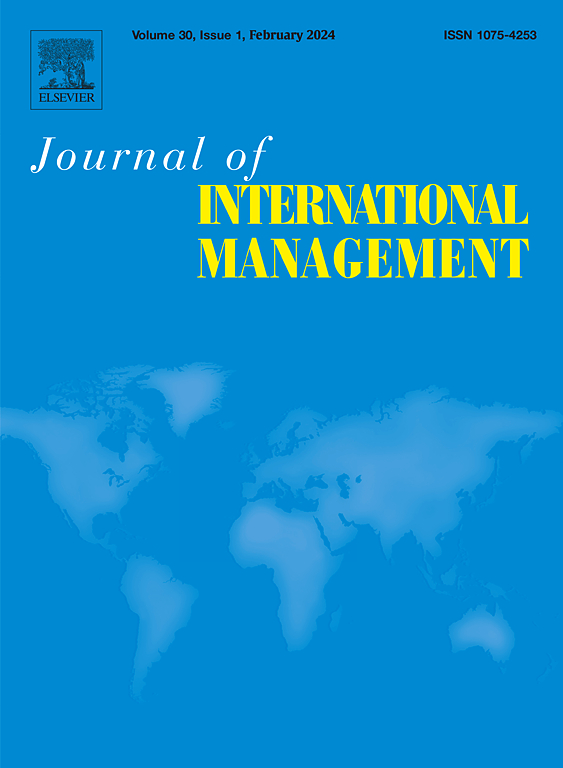揭示去全球化及其管理策略:以德国汽车工业为例
IF 4.9
2区 管理学
Q1 MANAGEMENT
引用次数: 0
摘要
本案例研究阐明了对迄今为止关于去全球化的概念性知识的理解,并探讨了跨国企业的管理如何处理这一现象。本案例研究从特定的行业和地理角度出发,揭示了德国汽车行业各自潜在的去全球化驱动因素和管理策略。在这个行业中,主要的去全球化驱动因素主要是地缘政治力量的负面影响,特别是由于全球汽车价值链的不透明性和脆弱性。去全球化的压力是通过一种去风险的方法来应对的,这种方法在战略上平衡了多样化以增强灵活性,同时封装了独立的区域生态系统。与普遍的预期相反,以逆全球化为特征的去全球化现象并不必然导致跨国公司的去国际化;相反,它出人意料地为企业国际化提供了机会。这使得目前在文献中应用的去全球化术语本质上是模糊和不确定的。因此,除了去全球化的驱动因素和管理策略之外,本研究还提炼了术语的清晰度,阐明了流行的去全球化叙事与跨国企业缺乏明显的去国际化反应之间令人困惑的差异,并提出将这种现象更好地称为再全球化。本文章由计算机程序翻译,如有差异,请以英文原文为准。
Unveiling de-globalization and its management strategies: A case study of the German automotive industry
This case study elucidates the understanding of so far conceptual knowledge on de-globalization and examines how multinational enterprises' management addresses this phenomenon. By taking a particular industry and geographic perspective, the case study unveils the respective underlying de-globalization drivers and the management strategies adopted by the German automotive industry. Within this industry, the primary de-globalization driver is predominantly shaped by a geopolitical force unfolding its negative effects, especially due to the global automotive value chain's opaqueness and fragility. De-globalization pressures are navigated through a de-risking approach that strategically balances diversification to enhance flexibility, while encapsulating independent regional ecosystems. In contrast to prevailing expectations, the de-globalization phenomenon, characterized as an inverse form of globalization, does not inherently lead to multinational firms' de-internationalization; rather, it surprisingly presents opportunities for heightened firm internationalization. This renders the terminology of de-globalization currently applied in the literature inherently ambiguous and inconclusive. Consequently, beyond the drivers and management strategies of de-globalization, this study refines terminological clarity, elucidating the puzzling disparity between the prevailing de-globalization narrative and absence of multinational enterprises' discernible de-internationalization responses, proposing that the phenomenon is better labeled as re-globalization.
求助全文
通过发布文献求助,成功后即可免费获取论文全文。
去求助
来源期刊

Journal of International Management
MANAGEMENT-
自引率
9.80%
发文量
67
审稿时长
81 days
期刊介绍:
The Journal of International Management is devoted to advancing an understanding of issues in the management of global enterprises, global management theory, and practice; and providing theoretical and managerial implications useful for the further development of research. It is designed to serve an audience of academic researchers and educators, as well as business professionals, by publishing both theoretical and empirical research relating to international management and strategy issues. JIM publishes theoretical and empirical research addressing international business strategy, comparative and cross-cultural management, risk management, organizational behavior, and human resource management, among others.
 求助内容:
求助内容: 应助结果提醒方式:
应助结果提醒方式:


